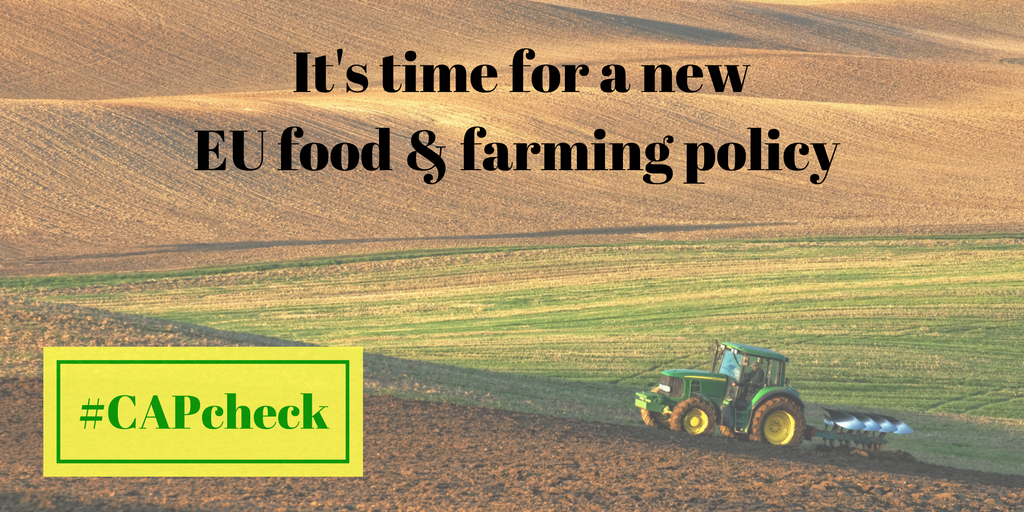After 2020, a new version of the European Common Agricultural Policy (CAP) will come into practice. This spring, the discussion on how this new version of the CAP should look like has started. Boerengroep is following the progress closely, as the CAP impacts the life of farmers all over Europe. The 6th of April, Boerengroep was present at an open consultation by the ministry of Economic Affairs in Kamerik. The 11th of May, we travelled to Brussel for an international symposium. Two interesting days, promising a complicated but important discussion on the renewal of the CAP in the coming years.
BY: SANNE VAN LEEUWEN
The CAP – what is it all about?
The Common Agricultural Policy was established in 1958 by the European Economic Community (EEC), which has become the current European Union, EU. This makes it the oldest EU policy and it still is one of the most important. Currently, almost 40% of the EU budget is used for the CAP – more than 55 billion euros – each year. Originally, the objective of the CAP was to ensure food security. Indeed, the CAP has contributed greatly to the modernization and productivity of agriculture. However, environmental objectives have been added to the CAP during multiple reformations. An important step for further ‘greening of the CAP’ was made in 2013. Agreement was reached that to obtain direct farm payments, farmers are obliged to fulfil certain criteria such as crop diversification, maintenance of permanent pasture and preservation of environmental reservoirs and landscapes.
Unfortunately, the promise of having a fairer, greener and simpler policy did not come true. Both farmers and societal organisations feel dissatisfied with the CAP in its current form. Distribution of subsidies goes per hectare, not taking into account the actual value of the services that different farmers provide or the differences per country. 80% of the budget is received by only 20% of all farming businesses, often the large-scale, efficient ones. Goals on soil and water quality and climate mitigation have not been reached. Sustainable farming practices are supported, but not stimulated; the CAP still remains a major driver of environmental damage by supporting agricultural practices that have a negative effect on the natural resources farmers rely on. These conclusions are supported by a first fitness assessment of the CAP, of which preliminary results can be found hier inschrijven.
After 2020, a new version of the CAP will be implemented. Any problems with the CAP in its current form should be identified especially now. All inhabitants of the European Union have been given the opportunity to share their opinion in a public consultation by the European Commission. In the Netherlands, the ministry of Economic Affairs organised a stakeholder-meeting on the 6th of April to gather opinions from the Dutch society. The European survey was closed the 2nd of May and the discussion continues on international, political level. In response, European Environmental Bureau (EEB) & BirdLife Europe organised a symposium on the 11th of May, to find a recipe for what they frame ‘a broken CAP’.
Sowing seeds for the future CAP, Kamerik, 6th of April 2017
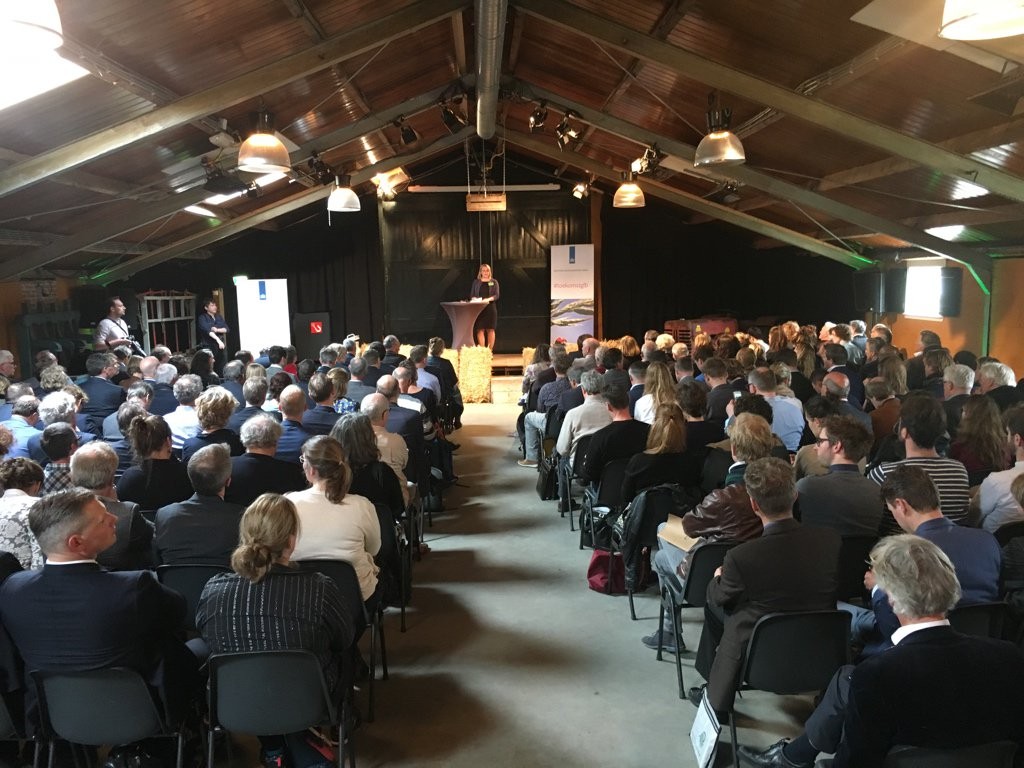
On the 6th of April, the Boerengroep travelled to Kamerik for this Dutch stakeholder-meeting. In a traditional farm transformed to host events, about 200 participants had gathered. Ex-minister of agriculture, nature and fishery Cees Veerman started the afternoon by sharing his view on the future CAP. Veerman was chairman of the Agricultural Markets Task Force, which was asked by European Commissioner Phil Hogan to write a report on position of European farmers in the market. During his entertaining speech he made clear that he has not been shy to write his opinion also in this report. For a reconnection between farmers and their land, soil, and animals, the system of payments should change. He proposed to give each farmer a basic income. This quite radical idea surely made an interesting start of the day.
After this speech participants were invited to share their opinion in different working sessions. Each session had its own topic, such as greening the CAP, risk management and markets, valuation of landscape and integration of food policy. All ideas were documented to help form the message which Dutch politicians will bring to Brussels during the member state meetings on the CAP. One of these Dutch politicians is State Secretary of Economic Affairs, Martijn van Dam. He concluded the day with a response to the results of the working sessions. He proposed that the CAP subsidies should not form the income of farmers, but pay for the societal services that farmers can offer, such as landscape conservation. After his speech, we got the opportunity to speak with him some more personally. An interesting note is that he admitted it will be hard to get all member states on the same line. Let’s hope he will indeed bring the right message across in the coming discussion.
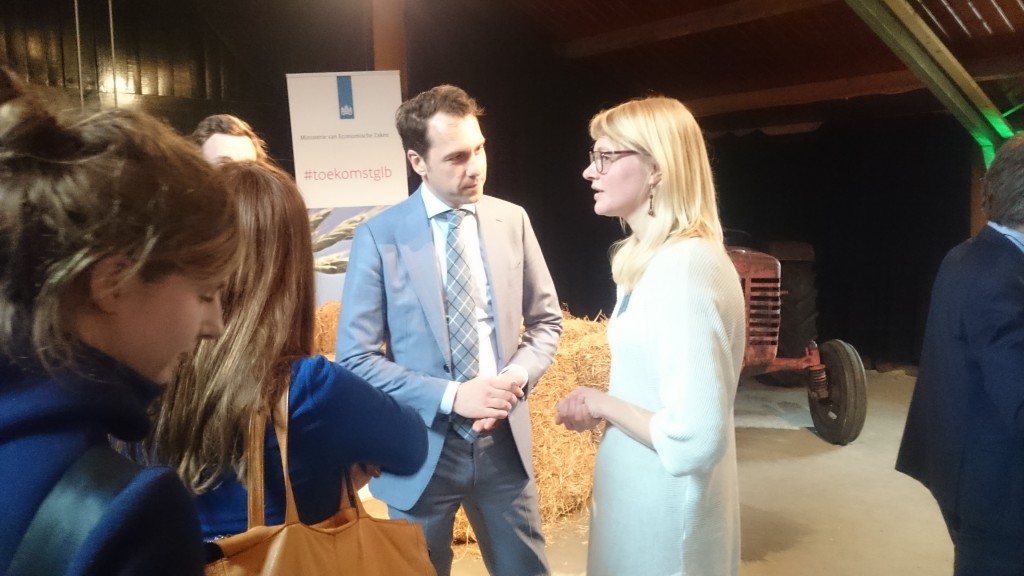
Who will fix the broken CAP? Brussel, 11th of May 2017
The 11th of May, our next visit in the context of the future CAP took us to an international conference in Brussel. Main organizing parties were BirdLife Europe and European Environmental Bureau (EEB). These NGOs also started a public campaign to send a message to decision-makers via the public consultation on the CAP. Under the name ‘Living Land’ they formulated answers which participants could use to call for a fundamental rethink of the CAP in order to make it more sustainable, healthier and fairer for all. After closure of the consultation the 2nd of May, it was reported that 258,708 people and 600 organisations and businesses joined Living Land in this vision. As a follow-up, the conference ‘Who will fix the broken CAP?’ was held to discuss with a diverse group of participants why the CAP is broken and how it should be fixed.
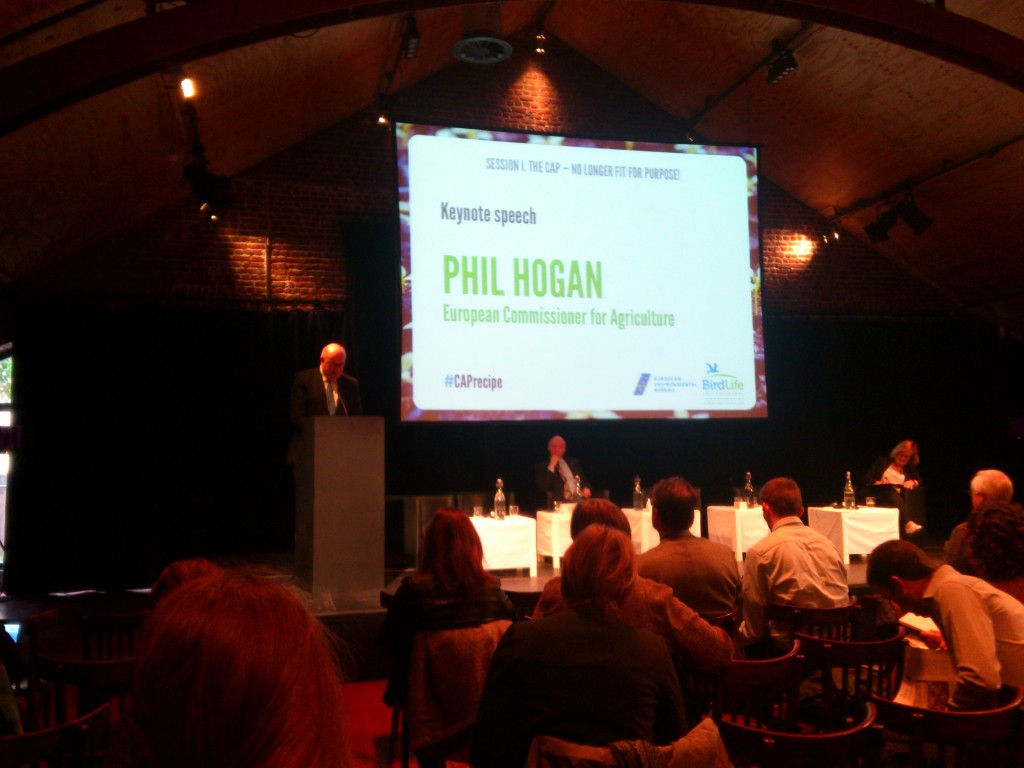
The first keynote speech of the day came from Phil Hogan, the EU commissioner for Agriculture and Rural Development since 2014 and thus a leading person in the reformation of the CAP. His conclusion was strong: the CAP is cracked, but not entirely broken. He admitted the need to make agriculture in Europe more sustainable. But he noted that a reform of the CAP will only be possible if we can convince the representatives of our own member state that a reform is necessary, and that they take this message to Brussel. There are options available already to reach goals on food production and environmental protection at the same time. As for the question how agri-environmental measures can be implemented effectively, he mentioned the Dutch collective approach as a potential solution.
The CAP is cracked, not entirely broken – Phil Hogan, EU commissioner for Agriculture and Rural Development
The notion of how the CAP is cracked, not entirely broken, set a good start for the rest of the morning. After the Hogan’s speech, the results of a study commissioned by BirdLife and EEB called ‘Is the CAP fit for purpose: a rapid assessment of the evidence’ were presented. As mentioned already, it was concluded that though the CAP has some small, local successes, it is mostly ineffective and inefficient to reach environmental and socio-economic objectives. Notably, this study was initiated because a Fitness Check of the CAP has been declined by EU member states. Such a Fitness Check actually is a regular procedure for all EU policies. One of the important messages from BirdLife and EEB to the European Commission is to perform a full Fitness Check still.
Afterwards, both representatives from civil society (Oxfam, Via Campesina and BirdLife, among others) as a high-level panel (EU politicians and counsellors) highlighted which problems and which priorities they see. An interesting note came from Dutch surgeon dr. Ignas van Bebber: he argued that in the current system, human health, nature, environment and sustainability are valued less than economy and intensive livestock. Is this the right balance? In the same line of thought, Fredrik Langdal (agricultural counsellor and Swedish representative to the EU) mentioned how the current direct payments should be changed into targeted measures for environmental protection. Prof. dr. Beate Jessel (President of the German Federal Agency for Nature Conservation) framed this shortly as public money for public goods, another key line of the day.
One more panel discussion followed before lunch, with actual EU policy makers. The Dutch Gerben-Jan Gerbrandy, member of the European Parliament, readdressed how important it is that first, all stakeholders will have to agree that indeed reform of the CAP is needed. If the CAP will serve to reach environmental goals, decisions should be made in cooperation with environmental bodies, not by the agricultural sector on its own.
The purpose of the rest of the day was to talk about concrete solutions. After lunch, the first actual farmers climbed the stage. Livestock farmers Alex Datema (Chair of Boerennatuur.nl), Olivier Mehuys (Efarmz) and Kurt Sannen (involved at IFOAM) shared their experiences on how farming can be productive and sustainable at the same time. But they also explained how little they are supported by the CAP in its current form. For the products they sell, a fair price may be obtained. CAP subsidies should not be merely income support but be used to pay for societal services, such as protection of biodiversity and provision of clean water, offered by sustainable farming. However, the system of payments should also be more simple, for example via regional collectives. Furthermore, farmers need independent advice, what they can trust and spread with their surroundings.
A slightly different perspective was taken in the last panel discussion. Instead of concrete solutions at farm level, concrete changes to the nature of the CAP were discussed. With all participants from NGOs on food, health and environment, quite radical positions were taken. How the CAP is locked-in because of the invested interests of the current decision-makers; that the policies are contradictory, half of them supporting intensification, half of them extensive practices. A fitness check is necessary. Climate should come first. Food has to be implemented in the CAP. The framing of the debate should change: we should not be discussing who gets what piece of the pie. Many exiting ideas, but the audience also made critical observations. Are these realistic expectations for 2020? What should be the main focus? A question that was answered differently by all panel members.
At the end of the day, we felt there are both the will and the ideas to change the CAP. It should be noted that many of the participants came from an environmental background. East-European countries were basically unrepresented. Positive reactions on radical changes can be expected from a crowd who is already convinced. The challenge is to convince all parties of the need to change, change towards payment of public services. A solution will have to be found how to measure the services that should be paid by the CAP. But as mentioned one last time by Ariel Brunner, senior head of policy at BirdLife Europe: we have no choice but to change. Europe has signed the Sustainable Development Goals set by the EU in 2015 and many of them involve farming. We know we can do it differently – so let’s do it.
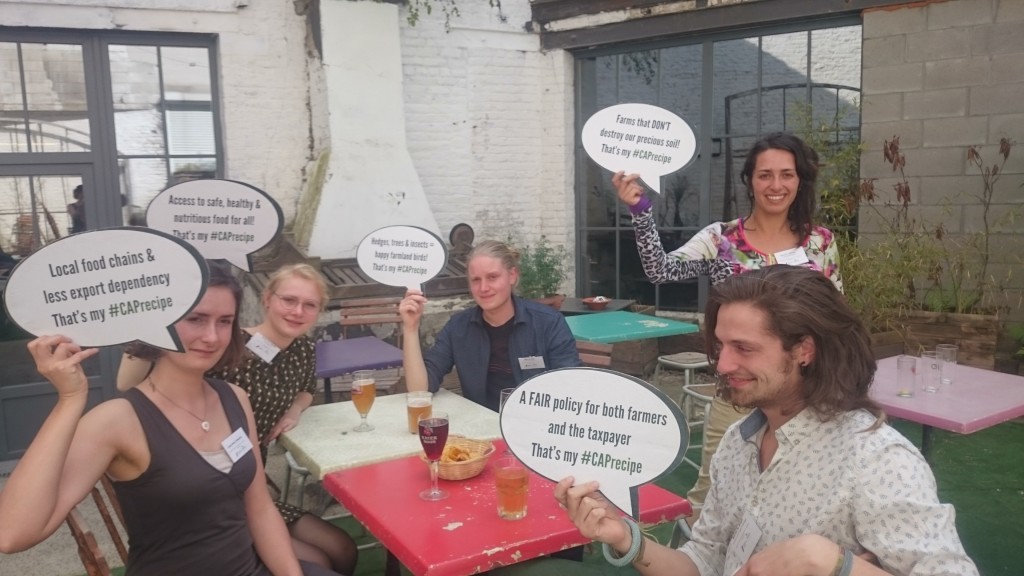
One idea came back clearly at both events: We should start paying farmers for the societal services they provide, thus using public money for public goods. Especially small farmers are already implementing sustainable measures on their farms. If we manage to change the CAP in the proposed direction, fair compensation for their work and thus a sustainable livelihood may come within reach. Now, it’s our job to convince the decision-makers and politicians.
With curtesy to Maarten Lodewijk de Graaff for sharing his reports of the symposium in Brussel.
More information:
– Actual developments in the formation of the CAP, reported by the Ministry of Economic Affairs (in Dutch)
– Full report by the Agricultural Markets Task Force on improving the position of farmers in the food chain
– The Living Land campaign by BirdLife, EEB and WWF
– Full speech by EU commissioner Phil Hogan during the conference in Brussel
– Results of the fitness assessment commissioned by BirdLife and EEB, plus their response
– Report of BoerenNatuur with their view of the CAP2020 (in Dutch, English summary included)
– CAP2020, a platform by the IEEP where developments and comments on the CAP are shared


